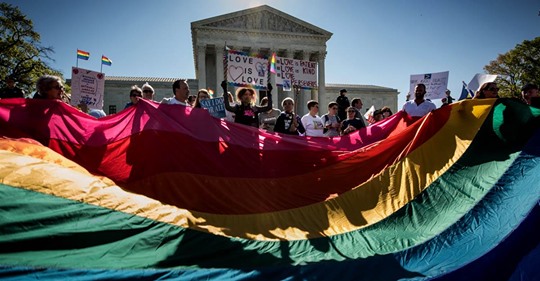The decision said Title VII of the Civil Rights Act of 1964, which makes it illegal for employers to discriminate because of a person’s sex, also covers sexual orientation and transgender status. https://www.nbcnews.com/politics/supreme-court/supreme-court-rules-existing-civil-rights-law-protects-gay-lesbian-n1231018?fbclid=IwAR1RY3MxmX8GqMWb72CCasVcYG_aIHQnpm5imBauKcnMh1w0aef_hJ4xEcQ
By Pete Williams
The U.S. Supreme Court ruled Monday that existing federal law forbids job discrimination on the basis of sexual orientation or transgender status, a major victory for advocates of gay rights and for the nascent transgender rights movement — and a surprising one from an increasingly conservative court.
By a vote of 6-3, the court said Title VII of the Civil Rights Act of 1964, which makes it illegal for employers to discriminate because of a person’s sex, among other factors, also covers sexual orientation and transgender status. It upheld rulings from lower courts that said sexual orientation discrimination was a form of sex discrimination.
Equally surprising was that the decision was written by President Donald Trump’s first Supreme Court appointee, Neil Gorsuch, who was joined by Chief Justice John Roberts and the court’s four more liberal members to form a majority.
An employer who fired an individual for being homosexual or transgender fires that person for traits or actions it would not have questioned in members of a different sex,” Gorsuch wrote for the court. “Sex plays a necessary and undisguisable role in the decision, exactly what Title VII forbids.”
“Those who adopted the Civil Rights Act might not have anticipated their work would lead to this particular result,” he wrote, adding, “But the limits of the drafters’ imagination supply no reason to ignore the law’s demands.”
“Only the written word is the law, and all persons are entitled to its benefit,” he wrote.
Across the nation, 21 states have their own laws prohibiting job discrimination based on sexual orientation or gender identity. Seven more provide that protection only to public employees. Those laws remain in force, but Monday’s ruling means federal law now provides similar protection for LGBTQ employees in the rest of the country.
Gay and transgender rights groups considered the case a highly significant one, even more important than the fight to get the right to marry, because nearly every LGBTQ adult has or needs a job. They conceded that sexual orientation was not on the minds of anyone in Congress when the civil rights law was passed. But they said when an employer fires a male employee for dating men, but not a female employee who dates men, that violates the law.
President Donald Trump, at a White House roundtable on senior citizen issues, called the decision “very powerful” and said “we live with” it.
“They’ve ruled and we live with their decision. That’s what it’s all about, we live with the decision of the Supreme Court,” he said.
Gay rights advocates celebrated the ruling.
“The Supreme Court’s clarification that it’s unlawful to fire people because they’re LGBTQ is the result of decades of advocates fighting for our rights,” said James Esseks, director of the American Civil Liberties Union’s Lesbian Gay Bisexual Transgender & HIV Project. “The court has caught up to the majority of our country, which already knows that discriminating against LGBTQ people is both unfair and against the law.”
Sarah Kate Ellis, the president and CEO of GLAAD, said, “The decision gives us hope that as a country we can unite for the common good and continue the fight for LGBTQ acceptance.”
Democratic leaders also praised the decision, with House Speaker Nancy Pelosi, D-Calif., calling it “a victory for the LGBTQ community, for our democracy and for our fundamental values of equality and justice for all.”
Former Vice President Joe Biden, the presumptive Democratic presidential nominee, said the ruling was “a momentous step forward for our country,” adding that the court had “confirmed the simple but profoundly American idea that every human being should be treated with respect and dignity, that everyone should be able to live openly, proudly, as their true selves without fear.”
The ruling was a victory for Gerald Bostock, who was fired from a county job in Georgia after he joined a gay softball team, and the relatives of Donald Zarda, a skydiving instructor who was fired after he told a female client not to worry about being strapped tightly to him during a jump, because he was “100 percent gay.” Zarda died before the case reached the Supreme Court.
Bostock, in a release put out by the Human Rights Campaign, said, “There are truly no words to describe just how elated I am,” adding that he was “devastated” when he was fired seven years ago. He said he was “sincerely grateful” to the Supreme Court, his attorneys, advocacy groups and others who supported him.
“Today, we can go to work without the fear of being fired for who we are and who we love,” Bostock said. “Yet, there is more work to be done. Discrimination has no place in this world, and I will not rest until we have equal rights for all.”
Bostock said in an interview with MSNBC’s Katy Tur on Monday afternoon that the ruling gave him “validation” for the last seven years, which he said were not easy. He said that not only did he lose his source of income when he lost his job, but he also lost his health insurance at a time when he was battling prostate cancer.
“In this this time of uncertainty, and certainly some dark days with a civil unrest going on around us, my hope is that this this brings a little bit of sunshine to these dark days, because what it tells me is there is hope,” Bostock said. “I had faith in the system and I had faith that the justices would do the right thing. And I think this is just one step in laying the groundwork, though, because it underscores given everything going on in our country today that we still have more work to do.”
In their statements, Pelosi and the Human Rights Campaign called for Senate passage of House-passed legislation called the Equality Act, which would prohibit discrimination against LGBTQ people in employment as well as housing, education and other areas.
The transgender case ruled on by the court involved Aimee Stephens, who was dismissed from her job at a Michigan funeral home two weeks after she told the company was transgender. She said her boss explained to her she was fired because she failed to follow the dress code.
“He said, this is not going to work,” Stephens said. “And he handed me a letter firing me and offering me what I took to be hush money to keep my mouth shut.”
Stephens did not live to see the case decided. She died May 12 while undergoing hospice care for kidney disease, but her surviving spouse carried on the legal fight.
The ACLU told the court hers was a clear case of sex discrimination, because if she had been assigned female sex at birth she would not have been fired for wanting to come to work dressed as a woman. Instead Stephens was assigned male sex and was fired because she failed to conform to the sex stereotypes of her employer, it argued.
The funeral home said treating men and women equally does not require employers to treat men as women.
“It is not sex discrimination for an employer to apply a sex-specific dress code or provide sex-specific changing and restroom facilities based on biological sex rather than one’s internal sense of gender,” the company told the court, adding that its actions did not disfavor one sex compared to the other.
The Trump administration had urged the court to rule that Title VII does not cover cases like these, in a reversal from the position the government took during the Obama administration.
“The ordinary meaning of ‘sex’ is biologically male or female; it does not include sexual orientation,” the Justice Department said. “An employer who discriminates against employees in same-sex relationships thus does not violate Title VII as long as it treats men in same-sex relationships the same as women in same-sex relationships.”







